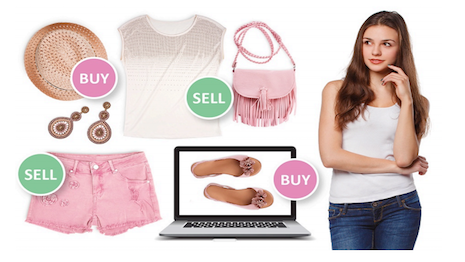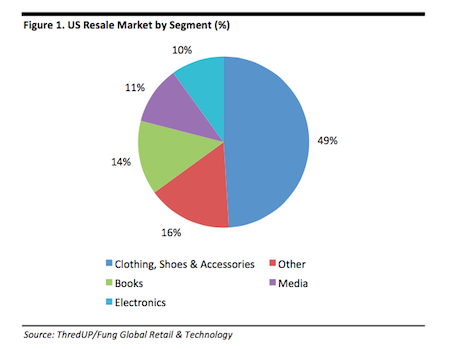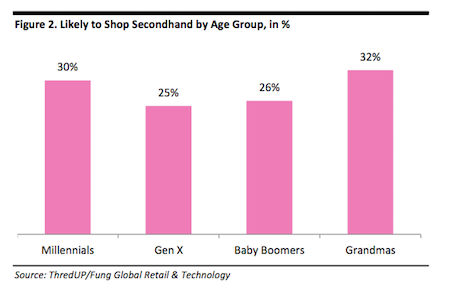 Fashion is by far the biggest segment in the reselling industry. Image credit: Fung Global
Fashion is by far the biggest segment in the reselling industry. Image credit: Fung Global
The fashion market category that relies on consigning high-end apparel and accessories is witnessing a period of enormous growth, outpacing the full-price segment of its industry by 20 percent, according to a new report from Fung Global Retail & Technology. The entire resale industry is expected to grow from $18 billion in 2016 to $33 billion by 2021. This data comes from retail think tank Fung Global Retail & Technology, which released the "Fashion Re-Commerce Update" report to dig into exactly how and why this sector has been taking off.
"Whether through online augmented resellers or through mobile peer-to- peer marketplaces, a multitude of key factors are driving continued growth of the fashion re-commerce sector," said Deborah Weinswig, managing director at Fung Global and author of the report. "These include: millennial penetration, the desire for value and cost savings, the entertainment factor of the treasure hunt for unique items, decluttering, environmental concerns, greater interest from higher-income shoppers and male customers, as well as resellers opening physical pop-up and brick-and-mortar locations."
 Fashion dominates the resale market. Image credit: Fung Global
Millennials make up the largest consumers of resale apparel, surpassed only by women over 65 years old. Millennials tend to have less money than their older counterparts and are the primary drivers of resale sales as they hunt for the best quality goods at the lowest prices.
This is also aided by the fact that many millennials consider digging through resellers to find the perfect piece a fun activity in itself, leading to even more sales.
Additionally, some resellers have even succeeded enough to open their own physical locations, providing even more of an opportunity for customers to buy resold apparel.
ThredUp, a prominent reseller, projects selling 10 million pre-worn items this year and is opening its first brick-and-mortar store to accommodate this.
Gender dynamics can also account for some of resale’s growth, as more men are becoming interested in fashion and are hunting for deals accordingly.
Brick-and-mortar
Many resale platforms have benefitted from the growth the industry has been seeing.
Jewelry resale platform TrueFacet is exhibiting how consumers are showing a growing interest in pre-owned high-end jewelry with powerful growth in the past year.
Sales of jewelry priced at $25,000 or more on TrueFacet have seen an 18 percent monthly growth. The platform also saw a 34 percent growth in the value of average orders (see story).
Many have even begun offering the same kinds of services one would expect from a luxury boutique owned by a brand.
Fashion dominates the resale market. Image credit: Fung Global
Millennials make up the largest consumers of resale apparel, surpassed only by women over 65 years old. Millennials tend to have less money than their older counterparts and are the primary drivers of resale sales as they hunt for the best quality goods at the lowest prices.
This is also aided by the fact that many millennials consider digging through resellers to find the perfect piece a fun activity in itself, leading to even more sales.
Additionally, some resellers have even succeeded enough to open their own physical locations, providing even more of an opportunity for customers to buy resold apparel.
ThredUp, a prominent reseller, projects selling 10 million pre-worn items this year and is opening its first brick-and-mortar store to accommodate this.
Gender dynamics can also account for some of resale’s growth, as more men are becoming interested in fashion and are hunting for deals accordingly.
Brick-and-mortar
Many resale platforms have benefitted from the growth the industry has been seeing.
Jewelry resale platform TrueFacet is exhibiting how consumers are showing a growing interest in pre-owned high-end jewelry with powerful growth in the past year.
Sales of jewelry priced at $25,000 or more on TrueFacet have seen an 18 percent monthly growth. The platform also saw a 34 percent growth in the value of average orders (see story).
Many have even begun offering the same kinds of services one would expect from a luxury boutique owned by a brand.
 Millennials and grandmas drive the majority of resale. Image credit: Fung Global
For example, online consignment marketplace The RealReal broadened its position in the secondhand handbag market with a new appraisal service.
Starting May 8, The RealReal began offering members a complimentary appraisal service dedicated to consigning handbags. The in-person appraisals will be available at The RealReal’s Luxury Consignment Offices in New York and Los Angeles (see story).
As more of these types of resale platforms crop up, apparel brands will have to pay more attention to them and the large audiences they attract.
These platforms can significantly undercut a brand’s control of the market and represent a major new player in the fashion retail scene.
Millennials and grandmas drive the majority of resale. Image credit: Fung Global
For example, online consignment marketplace The RealReal broadened its position in the secondhand handbag market with a new appraisal service.
Starting May 8, The RealReal began offering members a complimentary appraisal service dedicated to consigning handbags. The in-person appraisals will be available at The RealReal’s Luxury Consignment Offices in New York and Los Angeles (see story).
As more of these types of resale platforms crop up, apparel brands will have to pay more attention to them and the large audiences they attract.
These platforms can significantly undercut a brand’s control of the market and represent a major new player in the fashion retail scene. 